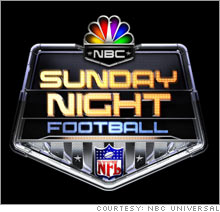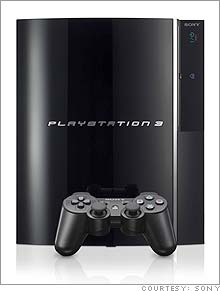 "Sunday Night Football" truly is the new "Monday Night Football" and pigskin fans could help lead an overall ratings revival at the Peacock Network.
"Sunday Night Football" truly is the new "Monday Night Football" and pigskin fans could help lead an overall ratings revival at the Peacock Network.NEW YORK (CNNMoney.com) -- NBC finally may show some signs of life this year. That's because the athletic ability of 300-pound linemen will do for the network what a lousy "Friends" spinoff and Martha Stewart couldn't: give NBC a real hit.
NBC has a guaranteed ratings magnet on its hands this season with "Sunday Night Football." Sunday night games used to air on ESPN, but the cable sports network owned by Walt Disney (Charts) will now air Monday night games instead.
ABC, which had broadcast "Monday Night Football" since it began in 1970, will no longer air pro football.
According to data from Nielsen Media Research, "Monday Night Football" on ABC averaged 16.2 million viewers a week, making it the 10th most watched program in prime time last year.
If NBC is able to replicate that, it would instantly become the network's biggest hit. It would also be a huge improvement over last season's Sunday night lineup for NBC.
Of the three shows that the network aired from 8pm to 11pm on Sundays last year, "Crossing Jordan" and "Law and Order: Criminal Intent" averaged slightly less than 11 million viewers apiece, and "West Wing," in its final season, had a paltry audience of just 8 million.
For General Electric (Charts)-owned NBC, which finished in fourth place among 18-49 viewers last season for the second consecutive year, having football become a big hit obviously would be welcome news for the struggling network as it attempts to lure back advertisers.
"NBC has a lot going for them. The NFL is a proven ratings generator and it's the anti-TiVo (Charts). People don't tend to fast forward commercials when watching sports," said Rick Dudley, president and CEO of Octagon Group, a sports marketing firm.
But can Sunday night truly become the new Monday night?
Better games and the best broadcasters
Sure, you could argue that pigskin fans may feel burned out by the time Sunday night rolls around and that they'd rather watch something like ABC's "Desperate Housewives" or CBS' (Charts)s "Without a Trace" instead of another football game.
But there clearly is an audience for more football on Sunday nights. ESPN averaged about 8.9 million viewers a game for its Sunday night telecasts ... a respectable number considering that the cable network is available in about 83 percent of all TV households.
Availability won't be an issue for NBC since it's a broadcast network. What's more, NBC has several other developments working in its favor. One, the NBC Sunday night schedule looks great. (NBC actually kicks off the season on September 7 with a Thursday night game that pits defending Super Bowl champion Pittsburgh Steelers against the Miami Dolphins.)
This Sunday night, NBC has arguably the most anticipated regular season game of the year: the Indianapolis Colts versus the New York Giants (Go Big Blue!). That game pits the Colts' star quarterback Peyton Manning against his little brother, Giants' quarterback Eli Manning.
And later in the season, NBC will have the option of cherry-picking marquee games from Sunday afternoons and moving them to Sunday nights. That's a huge plus for NBC since it means fans won't be forced to watch games featuring a great team against a complete patsy or two mediocre teams playing each other as they did in seasons past.
ESPN often got stuck with games that may have looked intriguing on paper back when the schedules were made in the summer but turned into snoozers by the time fall rolled around.
For example, a Sunday night game last October matching up the Seattle Seahawks, who wound up going to the Super Bowl, and the Houston Texans, the league's worst team, pulled in just 5.7 million viewers. And a game featuring the Kansas City Chiefs against the Texans in November garnered an audience of only 6.8 million.
ABC often had the same problem with its "Monday Night Football" games toward the end of the season.
"One of the things that hurt 'Sunday Night Football' and 'Monday Night Football' was that there was no flexibility in the schedule. NBC won't have that problem," said Brad Adgate, senior vice president of corporate research for Horizon Media, a media buying firm that does work for NBC.
It also helps that NBC snared former "Monday Night Football" broadcasters Al Michaels and John Madden away from ABC to serve as the commentators for "Sunday Night Football." Madden and Michaels may have some critics, but they are widely viewed by many as the best broadcasting team in football.
"NBC has put together the A-plus team in the booth with Madden and Michaels," said Octagon's Dudley.
Some may scoff that people don't watch games because of the broadcasters. But a case can be made that NBC will have an easier time getting fans to adapt to Sunday night being the new Monday night because of the familiarity provided by Michaels and Madden.
Weaker competition bodes well for NBC
NBC may also have an opportunity to do well since other networks' Sunday night schedules don't seem as fearsome as they did two years ago. The critical and fan fervor surrounding "Desperate Housewives" cooled considerably last year, and ratings dipped a bit. ABC also moved its monster hit "Grey's Anatomy" from Sundays to Thursdays.
Plus, football won't have to compete with "The Sopranos" either since HBO isn't going to begin airing the final eight episodes of its hit series until next March at the earliest. (HBO, like CNNMoney.com, is owned by Time Warner (Charts).)
This is not to say that "Monday Night Football" on ESPN is going to be a ratings loser. It should do well also ... just not as well as NBC's broadcasts.
Add that all up and you have a touchdown for NBC on Sunday night ... which should help the network become more competitive in the overall ratings race.
NBC could parlay big ratings on Sunday into interest for new shows that are attracting a lot of favorable buzz, such as "Studio 60 on the Sunset Strip," "Heroes" and "30 Rock," as well as larger audiences for successful sophomore shows "The Office" and "My Name is Earl."
"Football does two things for NBC. It provides a promotional platform that it didn't have before and gives the network one less night that it has to program," said John Rash, senior vice president and director of broadcast negotiations with Campbell Mithun, a media buying firm.
"NBC should break its ratings fall this season and begin to position itself to be significantly more competitive," he added.
And if that's the case, NBC would have football to thank for finally making it Must See TV again.






